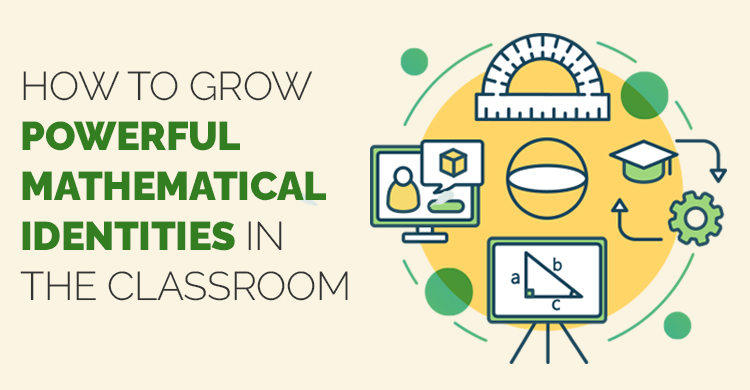Ponder for a moment and think back to when you were in grade school or high school. Was there a teacher that influenced you or made you feel that you could be successful in mathematics? Was there an adult that pushed you to be the “best version of you” in mathematics? I had strong role models early on, yet there was one teacher who made a lasting impression.
Since kindergarten, I always remembered being called upon by my peers to help them with mathematics. One of my early memories in elementary school was being asked to work with a small group to teach them how to multiply. In fifth grade, I even received the special desk in Mrs. Jackson’s class so I could be the teacher’s helper. However, seventh grade was a pivotal year. In 7th grade I discovered how much I loved Mathematics. I felt successful “doing mathematics” and in my 7th grade mind, mathematics was my favorite subject.
In my middle school, advanced students in mathematics were always given the opportunity to move into high school Algebra in eighth grade. My brother had been placed into this opportunity two years earlier and I was looking forward to the challenge. However, my upcoming eighth grade teacher did not agree. Mr. Wyatt actually told my parents that he did not think I could “do” Algebra in 8th grade. In his words, “Mona was too social for his liking and did not possess the same mathematical ability (innate ability) as her brother.” Due to this, he felt that I would not be able to focus on the demand of the new content. I was devastated. How could he not believe in me? That is the sad news… however, if you know me, he did not hinder my passion for mathematics. The good news is that my parents believed in me and pushed me to pursue advanced mathematics all through high school and, to Mr. Wyatt’s surprise, I went on to successfully teach high school mathematics. (My parents had to keep him updated to “rub it in.”)
This personal story would have ended differently if my parents had not believed in me or if I had not believed in myself. Do all of our students have that strong support either at home or at school? Does every teacher on your collaborative team or school/district believe all students can learn mathematics? Mr. Wyatt’s comments and actions portray an “unproductive belief” about equity and access to meaningful mathematics.
NCTM (2014) compares the difference between the productive and unproductive beliefs that promote equity and access and influence a teacher’s teaching and a student’s learning of mathematics.
| Unproductive Belief | Productive Belief |
| Students possess different innate levels of ability in mathematics, and these cannot be changed by instruction. Certain groups or individuals have it while others do not. | Mathematics is a function of opportunity, experience, and effort – not of innate intelligence. Mathematics teaching and learning cultivates mathematics abilities. All students are capable of participating and achieving in mathematics, and all deserve support to achieve at the highest level. (pg. 11) |
Our own beliefs about teaching and learning mathematics impact our instructional and assessment decisions. For mathematics teachers and leaders, understanding the role of beliefs and attending to the diversity of those beliefs is critical for activating a vision of equity (NCSM, 2014). Collaborative teams and mathematics leaders can start with understanding growth messages and intentionally developing growth mindsets within students and themselves to build productive beliefs.
- All students can learn. Research has shown that students’ brains can adapt and grow in response to any learning opportunity (Dweck, 2006) (Boaler, 2013). The neurons in brains make more connections through every learning opportunity and mistake. When students have a growth mindset, they challenge themselves to learn more. Does your mathematics program ensure opportunity to learn for all students? Collaborative teams can support each other with creating classroom cultures to ensure success for all.
- Teacher messages are crucial. The next time you are in a staff or team meeting, listen for phrases like “those kids” or “those students can’t” or listen to students or parents comments. Do parents tell you, “I was never any good at mathematics and that explains why my child is struggling”? Work with your collaborative teams to identify the fixed messages that permeate fixed mindset and share strategies to encourage growth mindsets. Growth mindset is when teachers and students believe that abilities and intelligence are neither inherent nor fixed, but can be developed through perseverance and hard work (Dweck, 2006). Teachers with growth mindsets believe their instructional practices impact student learning. Students with growth mindsets believe that their math abilities can be developed through dedication and hard work. When students develop a growth mindset, they embrace mistakes as an opportunity to learn versus seeing the mistakes as a failure (Boaler, 2013).
- Challenging mathematical tasks are at the heart of developing growth mindsets. Collaborative teams need to be willing to implement challenging mathematical tasks to let students productively struggle. Through their effort and the ability to push themselves, students will develop a growth mindset. Teachers will communicate growth-mindset messages as students persevere through the task and encourage students to embrace mistakes and grow dendrites in their brain.
As you work with your collaborative teams to choose and implement cognitive demanding tasks, share specific strategies for developing growth mindsets. Analyze your mathematics program from the inside-out to ensure all students have opportunities to be challenged. Intentionality is critical as we work to inspire, educate, and believe that all students can learn mathematics.
I credit Mr. Wyatt and the response of my parents with my mathematics learning and teaching journey. It takes one person to support and challenge continual learning. It takes one person to encourage perseverance when learning is tough. It takes one person to believe all students can learn. Each student in your class is counting on you to be that one person. .
Boaler, J. (2013). Ability and Mathematics: the mindset revolution that is reshaping education. FORUM, 55, 1, 143-152.
Dweck, C. (2006). Mindset: The new psychology of success. New York: Random House.
Leinwand, S., Brahier, D. J., Huinker, D., Bass, H., Dillon, F. L., Larson, M. R., et al. (2014). Principles to actions: Ensuring mathematical success for all. Reston, VA: National Council of Teachers of Mathematics.
National Council of Supervisors of Mathematics. (2014). It’s Time (Themes and Imperatives for Mathematics Education). Bloomington, IN: Solution Tree Press
[author_bio id=”295″]






